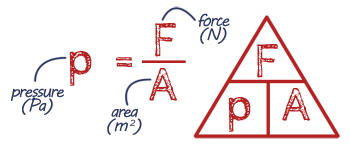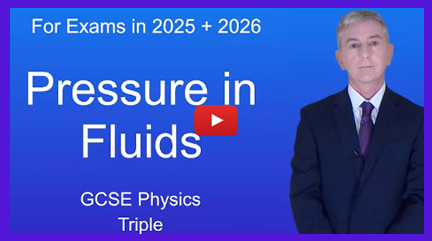
Pressure
Pressure is like the amount of that push or squeeze spread out over an area. So, if you push down hard with your hand on a small area of the table, you create more pressure than if you spread out your hand and push down with the same force. It's like comparing poking something with your finger versus pressing it with your whole hand.
Equations on this page:
Pressure
What is density?
Density is a measure of how much mass is packed into a certain volume of space. Imagine two boxes, one filled with feathers and the other with rocks. Even if both boxes are the same size, the box with rocks will feel heavier because the rocks are more densely packed compared to the feathers.
Pressure is affected by the density of the substance involved. Imagine diving into a pool. The deeper you go, the more pressure you feel. This is because there's more water above you pushing down, and water has a certain density. The deeper you go, the more dense the water becomes due to the weight of the water above pressing down on it. This increase in density leads to an increase in pressure.
What is upthrust?
Upthrust, also known as buoyancy or buoyant force, is a force that pushes objects upward when they are submerged in a fluid (a liquid or a gas). It's the force that makes objects float in water or rise when placed in a fluid.
When an object is placed in a fluid, if the upthrust force acting on it is greater than its weight (the force pulling it downward due to gravity), the object will float. If the upthrust force is less than its weight, the object will sink. And if the upthrust force and weight are equal, the object will remain suspended in the fluid, neither sinking nor rising - this is what we call neutral buoyancy.
Key Words
Atmospheric pressure - created on a surface by air molecules colliding with the surface.
Altitude - height above Earth.
Also see Forces, Motion, Force and motion
Revision Notes

The Cornell method is like a supercharged note-taking system that helps you ace your revision!
Print out our blank revision notes pages to help you revise.
How to make effective revision notes with the Cornell method.
Exam Questions & Answers

Download and print off practice our FREE worksheet with exam style questions on Cell Biology.
EQUATION Pressure
Pressure tells us how much force is being applied to a certain area. It shows how concentrated a force is. This means that if you apply the same force over a smaller area, the pressure is higher. That’s why sharp objects (like knives or nails) can easily cut or pierce things — they apply a lot of pressure over a small area.

Links for Learning
Revision Notes

The Cornell method is like a supercharged note-taking system that helps you ace your revision!
Print out our blank revision notes pages to help you revise.
How to make effective revision notes with the Cornell method.
Why Do I Need to Know About Pressure?
In Everyday Life
- Walking on snow or sand? You know why wearing snowshoes or flat-soled shoes helps prevent sinking—because they spread your weight over a larger area, reducing pressure.
- Using a sewing needle vs. a blunt object? A sharp needle exerts greater pressure at a point, which is why it pierces fabric so easily.
- Inflating a bike tire or sports ball: You need the right pressure inside to make riding or bouncing feel smooth and controlled.
- Walking barefoot on hot sand: You feel more heat because the soft surface increases the pressure on your feet, intensifying the sensation.
- Opening a sprinkler: The water emerges with force because it's under high pressure as it escapes through the small nozzle.
In Science & Physics Careers
- Predicting how fluids behave in pipes, blood flows through arteries, or storm systems build atmospheric pressure patterns.
- Designing safe containers and structures that can endure high pressures—like hydraulic systems, gas cylinders, or submarines.
- Applying pressure concepts in engineering, meteorology, medicine, and materials science.
- Working on innovations in medical devices (like syringes or pumps), aerodynamics, or underwater exploration equipment.
- Understanding the role of pressure in weather systems, volcanoes, or geological processes, vital for environmental science and research.



